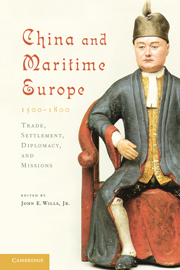Book contents
- Frontmatter
- Contents
- Contributors
- Preface
- Conventions
- Introduction
- 1 Maritime Europe and the Ming
- 2 Learning from Heaven: The Introduction of Christianity and Other Western Ideas into Late Ming China
- 3 Catholic Missions and the Expansion of Christianity, 1644–1800
- 4 Trade and Diplomacy with Maritime Europe, 1644–c. 1800
- Bibliography
- Index
2 - Learning from Heaven: The Introduction of Christianity and Other Western Ideas into Late Ming China
Published online by Cambridge University Press: 05 June 2012
- Frontmatter
- Contents
- Contributors
- Preface
- Conventions
- Introduction
- 1 Maritime Europe and the Ming
- 2 Learning from Heaven: The Introduction of Christianity and Other Western Ideas into Late Ming China
- 3 Catholic Missions and the Expansion of Christianity, 1644–1800
- 4 Trade and Diplomacy with Maritime Europe, 1644–c. 1800
- Bibliography
- Index
Summary
Of the alternatives represented in the intellectual scene in late Ming, the Westerners’ Learning from Heaven (Tianxue) was the least well precedented. In spite of efforts to assimilate some of it to vocabulary and concepts in classical texts, the Learning from Heaven could not escape also being labeled Western Learning (Xixue). It was foreign, whereas the other main intellectual alternatives to the Learning of the Way (Daoxue), including Buddhism, were only different (yi). Although critics of the missionaries cited foreign origins in attempts to discredit the Learning from Heaven, its foreignness remained less an issue in late Ming than it became in the Kangxi period in early Qing. With no obvious detriment to his contemporary reputation, Matteo Ricci was well known under the name Li of the Far West (Li Xitai). He and his confreres published books about that different part of the world, the Far West, from which they had come. Ricci reported being told in 1599 by a censor in Nanjing that, having lived in Jiangxi and other places, he was “no longer a foreigner in China. Can there be any objection to his residing in Nanjing, where there are so many Huihui [Moslems]?” Ricci had been proceeding since 1595 with the tactic of acting “as though we were men of China” (come uomini già della Cina). Especially in the early phase of the mission, there was a self-conscious effort by a few of the missionaries to be Chinese, but an important aspect of their impact on literati with whom they had contact was that they were from a distant, unknown place.
At the same time, they presented the essentials of their learning as universal. One of Ricci’s converts wrote in 1608 that the missionary not only was not different (yi) or strange, but also that his conduct and his learning were compatible with Heaven. The word “heaven,” which the Westerners used to distinguish the learning they sought to disseminate in China, was nicely ambiguous in its referents, pointing both to the religious Lord of Heaven (Tianzhu), or the Christian God, and to secular knowledge of patterns of heaven (tianwen), or astronomy in particular and science in general. The understanding of some of the converts moved from calculations involving celestial phenomena, through the realization that “the same minds and the same principles [are] in the Eastern and Western seas,” to recognition of an eternal, universal Lord of Heaven who was behind the religious truths as well as the regular “laws of Nature.”
- Type
- Chapter
- Information
- China and Maritime Europe, 1500–1800Trade, Settlement, Diplomacy, and Missions, pp. 78 - 134Publisher: Cambridge University PressPrint publication year: 2010



